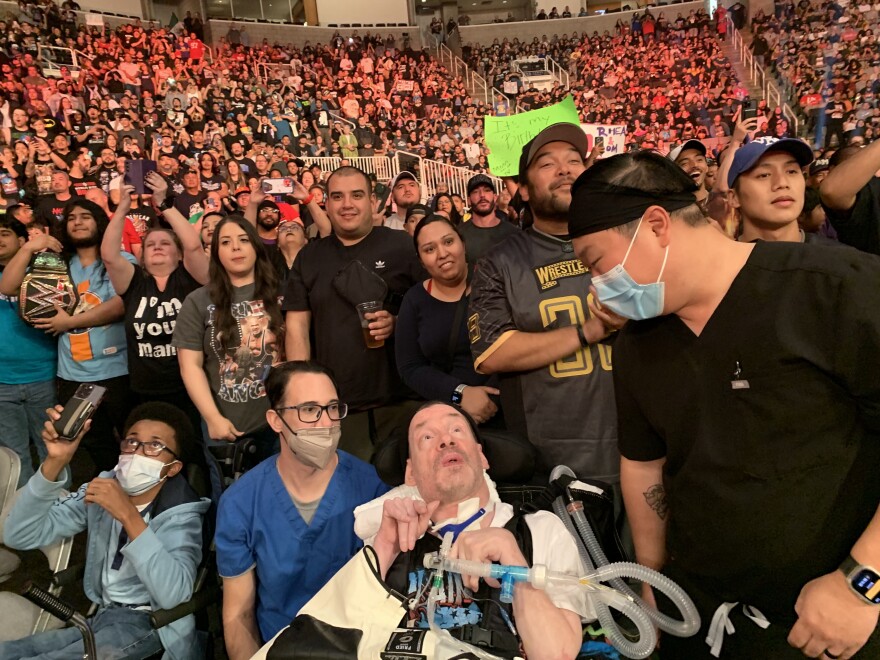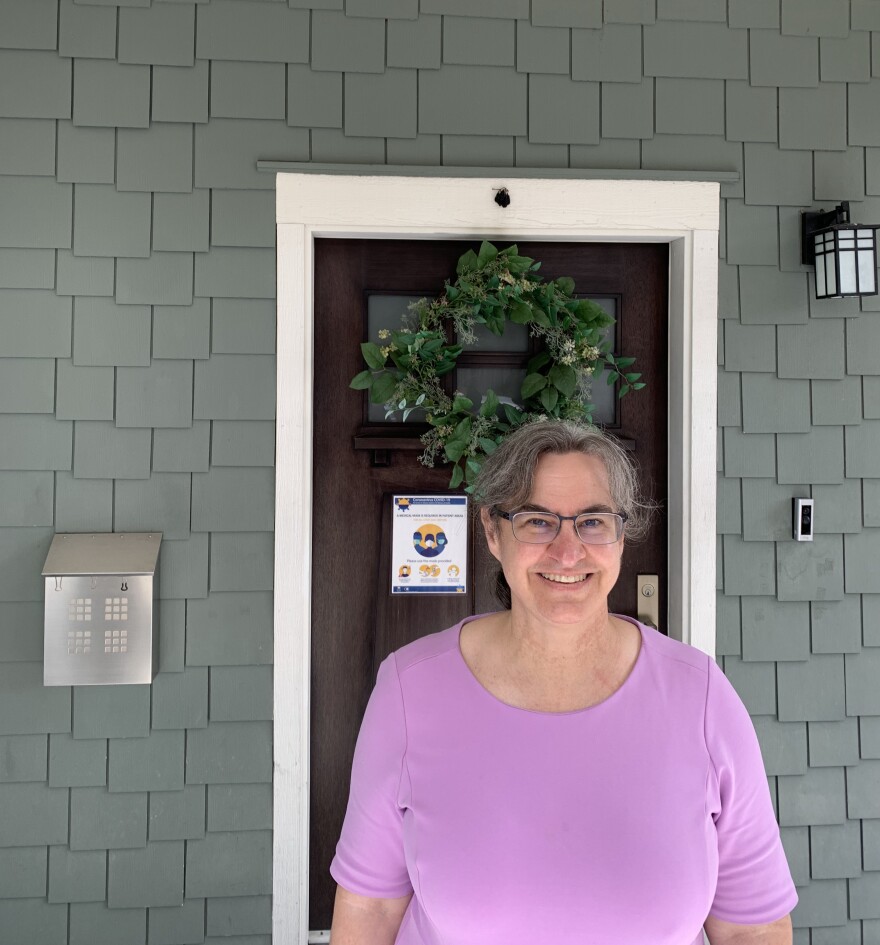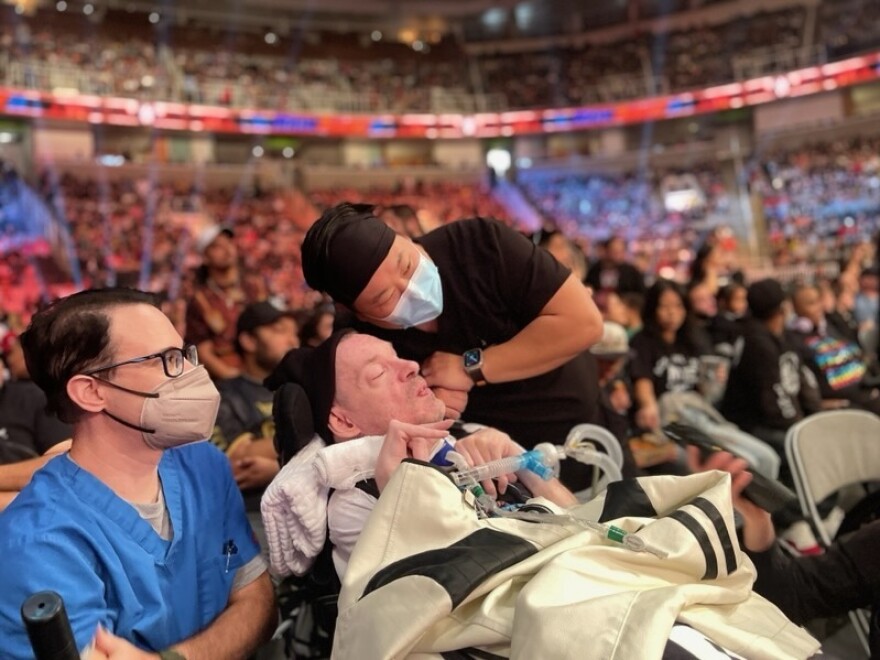From his seat in the stands, Kevin Carlson's eyes lock on a giant of a man straddling the top rope of the ring.
Carlson, a self-described WWE wrestling junkie who has cerebral palsy, boos the reviled wrestler along with the other 15,000 fans who pack the arena in downtown San Jose, Calif.
As the 62-year-old watches the giant fly across the ring landing on top of his opponent, a respiratory therapist suctions Carlson's lungs, and a nurse checks his catheter.
Carlson is here because his health care team snagged a row of wheelchair-accessible tickets, packed up extra ventilator batteries and oxygen tanks, and shuffled staffing schedules to free up three workers to accompany Carlson for the night.
Holistic health care like this is rare among the country's 2 million adults with developmental and intellectual disabilities.
Carlson's doctor, Clarissa Kripke, says this is what it looks like when health care "does better" by people with disabilities; it takes money, effort and, importantly, the conviction that sometimes physical health takes a second seat to joy. Kripke's goal is to provide care that extends beyond medical transactions.
"Health care is about helping people to participate fully in their lives," Kripke said, "not just about curing disease."
A promise of 'less restrictive living' for people with disabilities
Twenty-five years ago this June, the Supreme Court's landmark Olmstead v. L.C. ruling slammed the door on a dark era in U.S. history: decades of states institutionalizing hundreds of thousands of people with disabilities like autism, Down syndrome and cerebral palsy.
Justice Ruth Bader Ginsburg wrote in the majority opinion that locking people away had denied them "the pleasure of ... less restrictive living."

Since then, the number of people in large, state-run facilities has plummeted from nearly 200,000 in the 1960s to below 20,000 today. People with Down syndrome now live close to 60 years on average, compared to just 26 years in 1950.
But according to the 30 sources Tradeoffs spoke to, the freedom to live fuller and healthier lives remains elusive for many.
One key culprit is the U.S. health care system. The evidence suggests that the patchwork of doctors, hospitals and insurers that has replaced institutions as people's go-to source for care is falling short, limiting people's independence and harming their health.
Patients too frequently meet doctors and nurses who are untrained and uncomfortable caring for them; struggle to enter inaccessible exam rooms; and encounter insurers who deny their requests for essential equipment.
A limited but troubling body of research captures this system's shortcomings, showing that these patients are less likely to get preventive care such as dental exams and mammograms, and are more likely to take avoidable trips to the emergency room.
"People with intellectual disabilities need to be treated and respected the same way that we do every other patient who shows up at the doctor," said University of Chicago public health researcher Harold Pollack. "We are a long way from that."
Kripke, a family physician and University of California, San Francisco professor, has devoted her career to blowing up the obstacles patients with disabilities face.
Over the last two decades, in collaboration with partners like the advocacy organization, The Arc San Francisco and the Health Plan of San Mateo, a county-run health insurer, Kripke has gradually reshaped care for adults with complex disabilities in the San Francisco Bay Area.
The doctor has turned the traditional primary care model inside out. She's ditched the typical rushed, 15-minute visits in cramped exam rooms, and instead heads out to the small group homes where her patients live.
House calls, said Kripke, allow her to ask questions like, "How do you want to spend your day? Where do you want to go? What do you want to do?"

House calls and 'hidden work'
Kripke has developed a unique way to deliver care, particularly for those with complex medical needs.
She relies on staff in group homes — she calls them her eyes and ears — to monitor people's health and their progress on personal goals, like taking more outings or gaining life skills.
It's a level of attention that requires follow up and follow through, or what the doctor calls "hidden work" — coordinating with specialists or appealing insurance denials. Kripke estimates that for every hour of direct patient care, she spends another six on these other tasks — roughly triple what doctors caring for other types of patients spend.
Rather than billing for every test she runs or call that she makes, Kripke charges each patient's insurer or group home a flat monthly fee. She caps her patient-list at 100 people — less than 10% of the lengthy roster a typical primary care doctor manages.
Kripke's approach has paid off for Carlson. During a visit to his five-person group home in Redwood City last fall, Carlson said proudly that his weight had climbed from a dangerously-low 70 pounds to 111 since Kripke took over his care. Staff also slashed through insurer red tape to secure Carlson, a naturally gregarious guy, a speaking valve that helps him communicate while on his ventilator.
It's unclear if Kripke's model reduces spending; her program has yet to be studied. But perhaps the clearest sign it's a good deal: Group homes choose to pay her fee when, instead, their residents could get treated at local clinics for free.
Potentially, the longer Kripke keeps the most medically complex patients living in the community, rather than an institution, the bigger the payoff. Carlson's group home, for example, costs Medicaid and the state of California roughly $27,000 a month, whereas an intensive nursing facility — runs closer to $34,000.
When problems land people like Carlson in the hospital, as his kidney stones sometimes can, Kripke keeps a close eye on her patients' care there, too, and believes that helps them get home sooner and in better shape. That, theoretically, could save taxpayer-funded programs like Medicaid and Medicare money.
More training and a better pay structure could spread the model
Kripke estimates some 50 other doctors in the country are honing innovative models to deliver high-quality care to this population. She, herself, has trained thousands of caregivers, advocates and providers.
Yet, it will be difficult for approaches like hers to spread more widely without more training for frontline clinicians. The workforce lacks both specialists for people with the most complex conditions and primary care providers with the insight to respectfully treat patients with disabilities.
"It's as hard today for adults with developmental disabilities to find attentive, loving, expert care as it was in the early 2000's when I was starting out," Kripke said.
A recent national survey of physicians found just 4 in 10 felt "very confident" in their ability to provide the same quality of care to patients with a disability as those without one. Only about 15% of U.S. medical schools have joined a national initiative to bolster training.
Without more pay, many clinicians may be reluctant to invest the extra time and training to do this work. A bipartisan House bill introduced in 2023 — the so-called HEADs UP Act — would boost certain payments for providers serving this population.
Ari Ne'eman, who served on the National Council on Disability during the Obama administration, said scaling work like Kripke's requires both insurers and providers to make big shifts.
"We really need additional training," he said, "And we need to ensure that [pay is] aligned with the amount of time it takes physicians to provide competent and accessible care to people with disabilities."
New federal rules signal hope
Kripke's approach is focused on caring for adults with the most medical needs — a small slice of the broader disability community. New and forthcoming federal regulations aim to improve care and inch closer to delivering more independence for all U.S. adults with developmental disabilities.
Starting last year, group homes began facing closer scrutiny over the amount of privacy and autonomy they offer residents, for example, locking their bedroom doors or setting their own schedules.
Federal officials expect to finalize rules this spring that target discriminatory policies like relying on the inaccessible medical equipment that still litters America's hospitals or putting people with disabilities at the end of the organ transplant line.
"It is critical that people be able to get in the door and that people be able to get on the table," said Alison Barkoff, who leads the Administration for Community Living at the U.S. Department of Health and Human Services. "The lack of accessibility has been a huge barrier to preventative health care."
People with disabilities can spend months — even years — wading through webs of approvals to get critical care, like more help at home or a new wheelchair. A regulation finalized this year to take effect in 2026 requires Medicaid and private Medicare insurance plans to make faster, more transparent decisions about whether they will cover these services.
'There's a waitlist for everything'
Better health care is one piece, advocates say, in their decades-long fight to help people with disabilities live more independently. What's also required is an expansion of a wide range of services, from housing to help preparing meals.
"There's a waitlist for everything when you have a disability," said Melissa Crisp-Cooper, who has cerebral palsy and works for The Arc San Francisco.
A lack of paid health aides who help people shower, shop and get to work have led to fewer options. "Because of low wages and a lack of respect," said Barkoff, "we are at a point where the vast majority of providers are turning down referrals and even closing services."
Between 200,000 and 700,000 people are waiting for at least one service they need to live in the community, and some data suggest Black and Hispanic people are hardest hit.
Some family members of people with disabilities — and even doctors — frustrated by these resource constraints insist that a return to larger, institution-like settings is necessary.
"That's just not true," said Kripke.
Over her 20-year-career, she's seen enough proof that people can thrive outside of big institutions — even patients with the most complex needs, like wrestling fanatic Kevin Carlson.
"People didn't know that could be done before," said the doctor, but now that they do, the onus is on policymakers — and the health care system — to make living freer and fuller a reality for all.
This story comes from the health policy podcast Tradeoffs. Dan Gorenstein is Tradeoffs' executive editor, and Leslie Walker is a senior reporter/producer for the show, where a version of this story first appeared. Sign up for Tradeoffs' weekly newsletter to get more health policy reporting in your inbox.
Copyright 2024 TRADEOFFS. To see more, visit TRADEOFFS.


